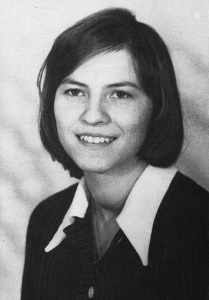
Anna Elisabeth "Anneliese" Michel was a German woman who underwent 67 Catholic exorcism rites during the year before her death. She died of malnutrition, for which her parents and priest were convicted of negligent homicide. She was diagnosed with epileptic psychosis and had a history of psychiatric treatment that proved ineffective.
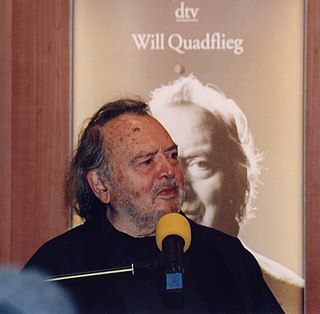
Friedrich Wilhelm "Will" Quadflieg was a German actor from Oberhausen. He was the father of actor Christian Quadflieg. He is considered one of Germany's best post-war actors. One of his most widely recognized roles was in the title role in the 1960 film Faust. He also starred in a number of other roles. Quadflieg died from a pulmonary embolism.

Ohm Krüger is a 1941 German biographical film directed by Hans Steinhoff and starring Emil Jannings, Lucie Höflich, and Werner Hinz. It was one of a series of major propaganda films produced in Nazi Germany attacking the United Kingdom. The film depicts the life of the South African politician Paul Kruger and his eventual defeat by the British during the Boer War.

The Ruler is a 1937 German drama film directed by Veit Harlan. It was adapted from the play of the same name by Gerhart Hauptmann. Erwin Leiser calls it a propagandistic demonstration of the Führerprinzip of Nazi Germany. The film's sets were designed by the art director Robert Herlth. Location shooting took place around Oberhausen and Pompeii near Naples. It premiered at the Ufa-Palast am Zoo in Berlin.

The Curtain Falls is a 1939 German crime film directed by Georg Jacoby and starring Anneliese Uhlig, Elfie Mayerhofer and Hilde Sessak. It was based on a play by Paul van der Hurck and was made by UFA at the company's Babelsberg Studios in Berlin. The film's sets were designed by the art director Erich Kettelhut.

Chemistry and Love is a 1948 East German comedy film directed by Arthur Maria Rabenalt and starring Hans Nielsen, Tilly Lauenstein and Ralph Lothar. It is an anti-capitalist satire inspired by a stage play by the communist writer Béla Balázs. The plot is built around the discoveries of a crusading inventor.
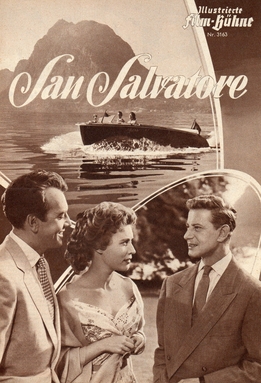
San Salvatore is a 1956 West German drama film directed by Werner Jacobs and starring Dieter Borsche, Antje Weisgerber and Will Quadflieg.

Don Cesare di Bazan is a 1942 Italian historical adventure film directed by Riccardo Freda and starring Gino Cervi, Anneliese Uhlig and Paolo Stoppa. The film is set during the Catalan Revolt of the Seventeenth century. It is based on a play by Philippe Dumanoir and Adolphe d'Ennery. It marked the directoral debut of Freda who went on to be a leading commercial Italian filmmaker.

Anneliese Uhlig was a German-born film actress.

The Black Robe is a 1944 German drama film directed by Fritz Peter Buch and starring Lotte Koch, Richard Häussler, and Kirsten Heiberg.
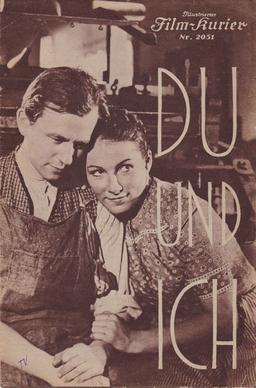
You and I is a 1938 German romance film directed by Wolfgang Liebeneiner and starring Brigitte Horney, Joachim Gottschalk and Paul Bildt.

Enemies is a 1940 German drama film directed by Viktor Tourjansky and starring Brigitte Horney, Willy Birgel and Reinhold Lütjohann. The film was a Nazi propaganda work, attacking Poland which Germany had invaded the year before. The film's sets were designed by Herbert Hochreiter, Alfred Metscher and Julius von Borsody.
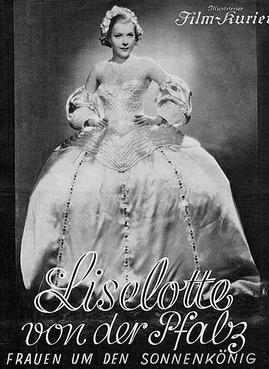
The Private Life of Louis XIV or Liselotte of the Palatinate is a 1935 German historical film directed by Carl Froelich and starring Renate Müller, Eugen Klöpfer and Maria Krahn. It was shot at the Tempelhof Studios in Berlin and premiered at the city's UFA-Palast am Zoo. The sets were designed by the art directors Walter Haag and Franz Schroedter. The film's English language release title is a reference to the hit British film The Private Life of Henry VIII (1933).

The Forester's Daughter is a 1952 West German musical comedy film directed by Arthur Maria Rabenalt and starring Johanna Matz, Karl Schönböck and Will Quadflieg. It is based on the 1907 operetta Die Försterchristl, which is set in the Austrian Empire during Franz Josef's reign. The film is part of the operetta film subgenre. It was shot at the Bavaria Studios in Munich and on location around Bad Tölz. The film's sets were designed by the art director Robert Herlth.
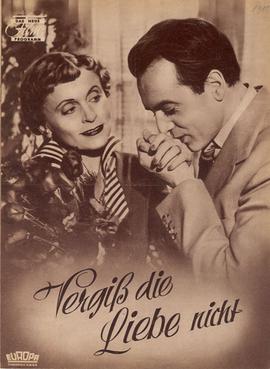
Don't Forget Love is a 1953 West German romantic comedy film directed by Paul Verhoeven and starring Luise Ullrich, Paul Dahlke and Will Quadflieg. It was shot at the Wandsbek Studios as well as on location in Hamburg and Innsbruck. The film's sets were designed by the art directors Hermann Warm and Heinrich Weidemann.

The Appeal to Conscience is a 1949 German mystery film directed by Karl Anton and starring Karl Ludwig Diehl, Werner Hinz and Gustav Diessl. It was originally shot in 1944, but remained uncompleted until it was finished by DEFA in the post-war era. It remained unreleased until it was given a 1949 premiere in Austria. Subsequently it was distributed in East Germany in 1950 and West Germany in 1951.

The Court Concert is a 1948 German musical comedy film written and directed by Paul Verhoeven and starring Elfie Mayerhofer, Hans Nielsen and Erich Ponto. In the United States it was released as Palace Scandal.

Dreaming is a 1944 German historical musical drama film directed by Harald Braun and starring Hilde Krahl, Mathias Wieman and Friedrich Kayssler. It portrays the lives of the pianist Clara Schumann and her composer husband Robert Schumann.

Commissioner Eyck is a 1940 German crime film directed by Milo Harbich and starring Anneliese Uhlig, Paul Klinger and Herbert Wilk. It was shot at Tempelhof Studios in Berlin. Location shooting took place in Bavaria.

The Master of the Estate is a 1943 German drama film directed by Hans Deppe and starring Willy Birgel, Viktoria von Ballasko and Anneliese Uhlig. Location shooting took place in Pomerania, Mecklenburg and Ramsau in the Bavarian Alps. The film's sets were designed by the art directors Otto Gülstorff and Carl Ludwig Kirmse. It is based on the 1895 Swedish novel Der Majoratsherr von Halleborg by Alfred von Hedenstjerna.




















